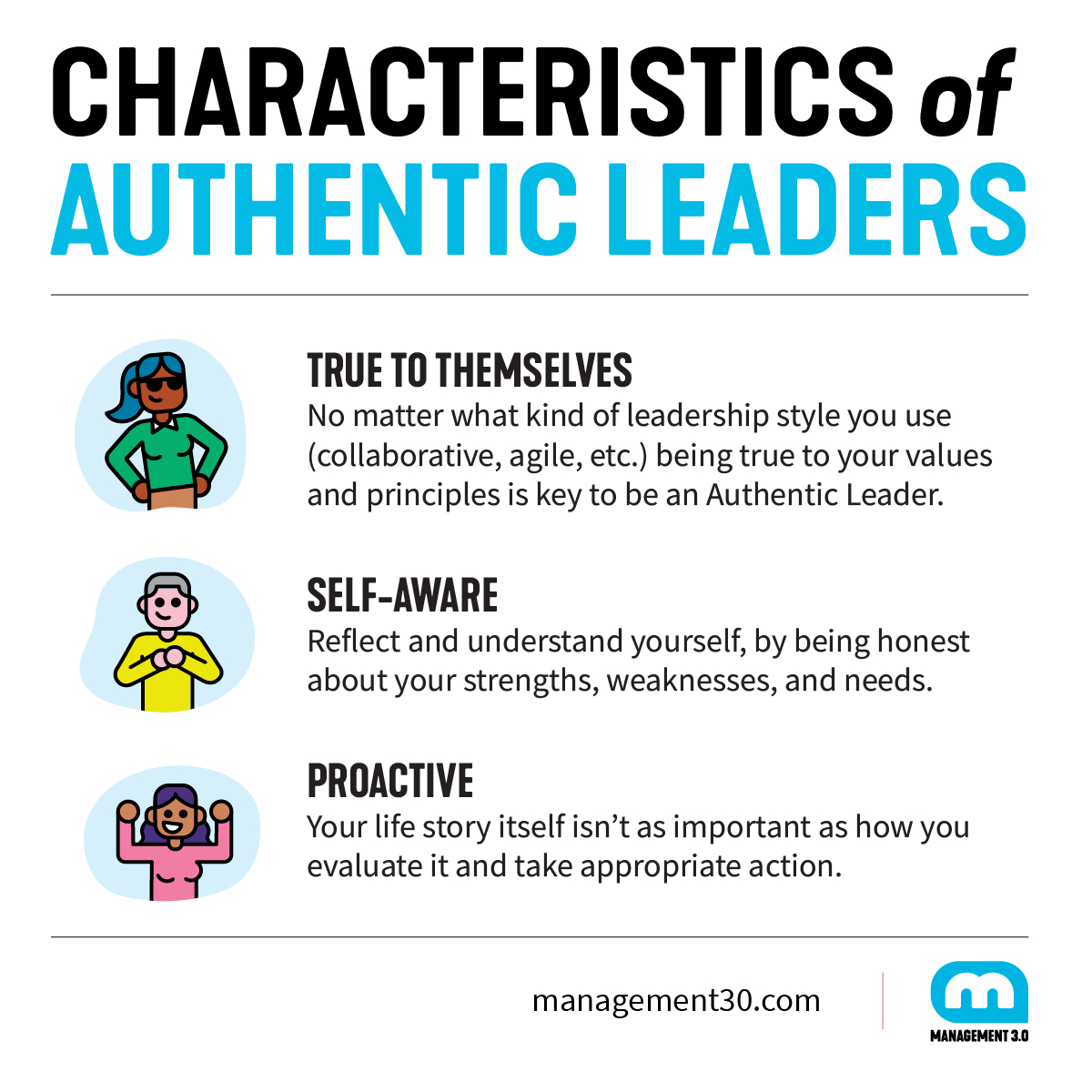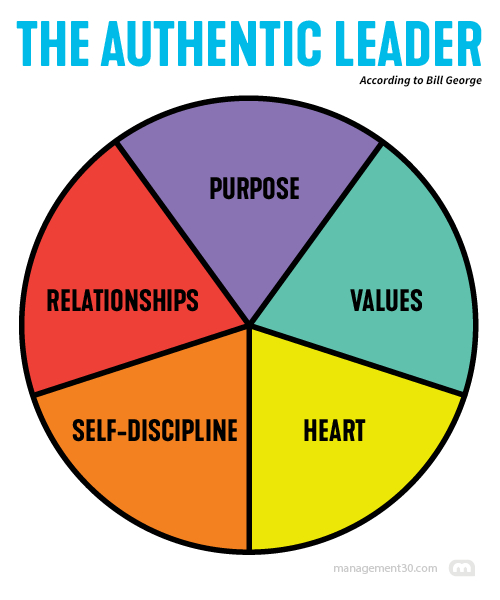Leaders are not born, they are made. Anyone can become a great leader if they have the right mindset and skill set. Sahin Appel, Management 3.0 Facilitator and Founding Member of the Management 3.0 Community explains what Authentic Leadership according to Bill George is and how you can benefit from it.
In our ever-changing world we long for honesty, transparency, and trust. Without these things, people leave jobs even though they are qualified and effective, make good money, and get along with their teammates and superiors. But if you can’t be yourself, being open and honest, people find it’s not worth it to stay. Authenticity seems to be a currency that humans have ignored for too long and at the same time the key to turning things around.
What is authenticity?
The term “authenticity” comes from the Greek authentikós, which means “genuine” and from the late Latin authenticus, which stands for “vouched for” and “reliable”. The term “authenticity” aims at genuineness in the sense of originality.
Authenticity is characterized by a pronounced ability in self-awareness and self-reflection. Authentic people are aware not only of their strengths but also of their weaknesses and act very consciously according to their values and principles. In doing so, their interactions with their peers are sincere. As observers, we often say about authentic people that they simply seem “real”.
What is Authentic Leadership?
Authentic Leadership refers to a leadership style in which the leader remains true to themself. It doesn’t matter whether that person leads as a servant leader, collaboratively, or something else.
Staying true to yourself is central in Authentic Leadership. Authentic Leadership is about being yourself and being true to your values. It’s about leading with integrity, transparency, and honesty. Authentic Leaders have a strong sense of self-awareness and are able to be vulnerable with their team members. This builds trust and creates an environment of openness and respect.
What do Authentic Leaders do differently than other leaders?
According to Bill George, Authentic Leaders frame their life stories in such a way that they are not observers but participants. This fosters self-awareness. Their behavior is based on their values and principles.
Having their values and principles be the internal driver for their behavior is as important to them as external recognition and rewards.
It’s not necessarily important what your story is but how you evaluate it. If you see yourself as a victim this will most likely lead you to be rather passive. But if you can learn lessons from your experiences, you can use those lessons to inspire others to action.
The story of your life is not your life; it’s your story.
John Barth
Some say that humans are the sum of the stories we tell ourselves. Narrative and self-knowledge, as well as the resulting behavior according to our values and principles, are crucial factors that define Authentic Leadership.

The Authentic Leadership Model according to Bill George
Bill George has defined 5 dimensions that help shape Authentic Leadership. These are Purpose, Values, Heart, Relationships, Self-Discipline.
Purpose: The first step to being an Authentic Leader is to know yourself, to have an awareness of yourself, your strengths, and weaknesses. Only in this way can you learn more about your personal needs and thus your purpose.
Values: Every decision that you as an Authentic Leader make and every behavior that you display are predetermined by your values. Therefore, you are authentic when your own values are transparent.
Heart: As an Authentic Leader, it is important to be empathetic with yourself and with your team members. In doing so, you should find the right balance between the needs of yourself, your team members, and those of the organization. To achieve this, you must have a clear understanding of the kind of relationship you have with yourself, and everyone else.
Self-Discipline: Always practice what you preach. Authentic Leadership can be learned. But the learning path itself can be a painful self-exploration. In order to stay on the path, you’ll need a lot of self-discipline. Once you have learned to know yourself and are able to lead authentically, the opportunities that come as a result will amaze you!
Why is Authentic Leadership important? Why is authenticity at work important?
Authentic Leadership is the key to a team member’s heart and mind. They will be more transparent with an Authentic Leader than with an inauthentic one. Because of an Authentic Leader’s empathy, they will be willing and empowered to display their authentic self. Authenticity inspires dedication and engagement. When they can be themselves at work, your team will be dedicated and will enthusiastically follow your lead.
Studies have shown that Authentic Leadership results in higher levels of employee engagement and satisfaction. When employees feel like they can trust their leaders and that their leaders are genuine, they are more likely to be engaged and motivated to do their best work.
Imagine an environment in which nobody would fear being their authentic self. No more political skirmishes on the team. Instead, you have an environment of psychological safety where people openly express their opinions on issues, work creatively, and give each other constructive and open feedback. Through Authentic Leadership, we foster communication and transparency within the team. It also has a positive effect on team affiliation and performance. All these factors favor creative work and tolerance for experimentation. Wouldn’t this be a enjoyable workplace for you?
But the most significant added value Authentic Leadership delivers is not to others, but to yourself. Authentic Leadership frees us from the chains of judgment. It doesn’t just give us permission – it demands that we display our authentic self. No more facades or masquerades. It allows us to perceive things more consciously and to deal with issues more carefully. Because, the more authentic you are, the more vulnerable you are.
It should be noted that this is not about telling everyone your own life story. But it is about making yourself known – without having to fear that you will be attacked.

How to become an Authentic Leader and how can Management 3.0 help?
I believe Management 3.0 offers some of the most useful guides to Authentic Leadership because they espouse exactly the same ideals. Management 3.0 can tremendously enhance the capacity for self-awareness. Here’s how:
Through Moving Motivators, we can quickly illuminate ourselves and create a climate of safety in teams. Of course, playing Moving Motivators once is not enough. In fact, I recommend doing this often as self-awareness is like a muscle that needs to be exercised.
It has been my experience with my clients that Moving Motivators can be very overwhelming in coaching for Authentic Leadership if you do not have much practice in self-reflection. Therefore, I consider the values exercise that is part of many Management 3.0 Foundation Workshops, as it is very beginner-friendly.
I first ask everyone to pick 10 values from the Management 3.0 Big Values List that they think best describes themselves. In groups, they can discuss them with each other. In the second round, they reduce their choices to 5 and repeat. Then to 3 and repeat it again. In the process, we rotate the groups. The idea behind this approach is to stimulate self-reflection. After all, it is crucial for self-awareness. In this process, participants show themselves to be particularly vulnerable and transparent. But by all being in the same boat, they inspire each other and create an environment of psychological safety.
And now here is my secret, a very simple secret: It is only with the heart that one can see rightly; what is essential is invisible to the eye.
Antoine de Saint-Exupéry, The Little Prince
Through this exercise, we acquire a view of our environment. We perceive it and team members differently. As this increases the ability to empathize, I also recommend the Niko-Niko Calendar. I consider this as a simple practice for creating a transparent and psychologically safe system. Like Moving Motivators it allows team members to explore their own self-awareness.
The way we give feedback is an expression of the current culture. It is also a way of creating a culture in which Authentic Leadership can be and is perceived. The Feedback Wrap is perfect for this. It gives us a step-by-step guide and focuses on the benevolent expression of your own emotions as well as the sincere interest in finding a common solution.
How to tell if someone’s Authentic Leadership is authentic?
My intention is to show how important and difficult this preliminary work is for Authentic Leadership. Because it is important to distinguish between Authentic Leaders and those leaders who decorate their unhealthy personality as authentic. To tell the authenticity of Authentic Leadership, you have to check the capacity for self-reflection or empathy.
Experience shows that we often struggle to distinguish between authenticity, arrogance, and narcissism. Our self-confidence strengthens our authenticity. As an authentic person, we are not afraid to be outrageous. Authentic Leadership should not be misused as an excuse to do whatever we want, unfiltered. Yes, it offers us a lot of freedom and the idea may be tempting. But the true art of Authentic Leadership also lies in the ability of self-awareness. If this ability is weak, we tend to overestimate ourselves and come across as arrogant to our fellow team members. This damages the system for Authentic Leadership, since an emotional distance from the employees is formed.

Self-awareness is like an anchor. It enables us to be honest with ourselves. Arrogant or even narcissistic people have little to no such ability. Authentic people present their strengths and their weaknesses. Authentic people also allow themselves and their behavior to be questioned and do not feel the need to defend themselves or to resort to other coping strategies. They perceive it as an opportunity for self-reflection and not as an insult. Unlike the arrogant and narcissistic, authentic people treat others with respect and act consistently according to their values and principles. Do arrogant and narcissistic people also have their values and principles? Sure. But these can change situationally, because the focus for them is more on the external image and the effect. And should a serious attack against their values take place, they spare no effort to adapt them in response.
I observe a serious misconception in society. With the statement “Be true to yourself” many evaluate this as an egoistic thought. But this is not the case…just look at the benefits of Authentic Leadership. Because, if we could not be ourselves, self-awareness would be impossible. Being true to yourself doesn’t mean that you don’t care about others.
You can only give your best to other people if you give it to yourself.
Photo by Alexander Suhorucov (via Pexels)


